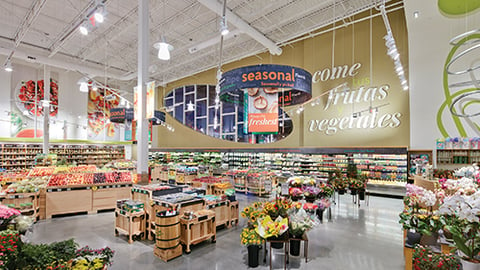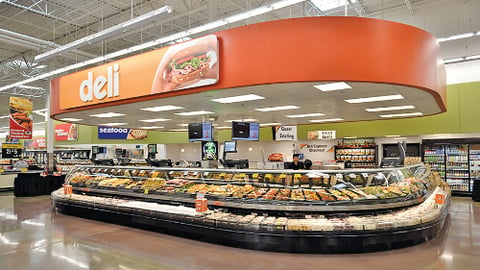Automated Kiosks in Food Retailing
The term “kiosk” has now become part of the lexicon, just as automated kiosks have become part of the supermarket experience.
Key Takeaways
- Automated kiosks offer the following benefits for consumers: a faster and more convenient checkout experience, time-saving benefits for retailers and their associates, and the ability for retailers to share relevant content with customers.
- In a world where shoppers are subject to thousands of daily marketing messages, kiosks can stand out as an interactive way to deliver customized information.
- Tablet kiosk technology has risen in popularity as retailers seek more compact yet durable and much more affordable kiosk hardware platforms than traditional kiosks.
“There are a variety of benefits to implementing automated kiosks in food retailing applications,” notes Rob Meiner, senior technical sales engineer at Aurora, Ill.-based Peerless-AV. “For customers, automated kiosks offer a faster and more convenient checkout experience where they can control the speed and bagging process. Automated kiosks also offer time-saving benefits for retailers and their staffs, as there will be fewer employees needed for checkout lanes, in turn creating more opportunities for profit.”
Another benefit of automated kiosks is the ability for retailers to share relevant content with customers because self-service kiosks are networked and can be remotely accessed and controlled from anywhere with an internet connection using cloud-based software, Meiner says.
Peerless-AV designs and manufactures standard and custom indoor and outdoor kiosks for many applications in food retailing, including self-service payment, digital signage, wayfinding and electrical vehicle-charging stations.
“We also offer all-in-one solutions where customers can seamlessly set up their kiosk right out of the box,” Meiner says. “From card readers to integrated touchscreens to cameras that gather crucial analytical data, our kiosks can be equipped with any technology to improve the customer experience.”
Peerless-AV’s design team meets with retail customers to discuss their needs and budget, and then designs kiosks accordingly. The company also offers tools to aid retailers in creating kiosks right from their own computers.
Kiosk Evolution
Coinstar can lay claim to having invented self-service coin-counting kiosks in the early 1990s. And while the company still has a single kiosk type in supermarkets, kiosk functionality and product offerings have evolved over the years, observes Michael Jack, VP of products at the Bellevue, Wash.-based company.
Coinstar’s turnkey service lets retailers focus on their customers and invest capital and talent where it matters most, Jack says. Additionally, there’s added value for retailers, as customers cashing in coins have extra cash on hand and are likely to purchase additional items or upgrade purchases for a higher basket ring.
This past year, Coinstar introduced AdPlanet, a digital ad platform that sits atop its kiosks and provides unblockable viewability, mapping, tracking and precise targeting capabilities.
“AdPlanet gives retailers ultimate flexibility for advertising products catering to their demographic,” Jack notes, “and can be customized in real time based on dayparts, conditions or events. AdPlanet works seamlessly with existing campaigns and systems. Coinstar will continue to add new products to its kiosk to create more choices for consumers and increased value for retailers.”
Analysts’ reports such as Frost & Sullivan’s show continued growth of self-service kiosks globally and in key sectors, including retail, Jack points out: “We believe kiosks are here to stay and will only increase in sophistication, functionality and variety of offerings.”
Competitive Advantage
Between autonomous delivery and mobile checkout options, more and more grocers are looking to new technology to maximize the shopper’s experience.
“Grocery store self-service kiosks can provide a streamlined experience for both customers and employees alike,” says Dave Loyda, director of strategic initiatives at Frank Mayer and Associates, in Grafton, Wis. “Grocers can personalize orders for bakery/deli items, provide wayfinding and loyalty program sign-up options. This can free up time for employees to focus on order delivery, food prep and more.”
Frank Mayer provides custom kiosk solutions as well as a recently launched line of self-service kiosk solutions called Approach, which includes floor, counter, wall and tablet options. The company has worked on a variety of retailer programs, including the Kroger Scan, Bag, Go program.
“Our kiosk solutions can perform many services, including self-order, transactional, loyalty, wayfinding, informational and more,” Loyda asserts, adding that the kiosks are designed and engineered specific to the targeted environment, which is especially crucial for the high-traffic grocery and supermarket sector, where the enclosure and hardware components must withstand the rigors of the store environment.
“The solutions offer various form factors,” he says, “and feature commercial-grade touchscreens, Windows and Android options, payment terminals, optional barcode scanners, and printer options. The kiosks can also offer assistive technology that allows for users with impaired vision, and our designs meet ADA guidelines for wheelchair accessibility for height and reach.”
Today’s shoppers are subject to thousands of daily marketing messages. In this “world of oversaturation,” Loyda says, kiosks can stand out as an interactive way to deliver information that feels customized to the recipient.
“Kiosks provide a competitive advantage and are an effective tool in branding efforts targeting the modern connected consumer,” he adds. “Offering customers everything from convenience to personalization, kiosks maximize the patron’s experience while delivering steady opportunities for a brand or retailer’s return on investment.”
Compact Solutions
Ordering kiosks provide convenience and faster service to customers, which Karla Guarino, director of sales and marketing at Frederick, Md.-based Kiosk Group, says equates to more repeat business, as well as lower overhead by offering 24/7 access.
Kiosk Group specializes in compact, durable and affordable tablet kiosk hardware solutions for iOS, Android and Windows, which are fully customizable with affordable custom branding and a five-year warranty.
The company’s recent innovations, according to Guarino, are compact printing kiosks with front servicing using desktop printers, and personal tablet devices to increase the comfort level of servicing the kiosk by employees without requiring third-party field service, as well as custom side brackets for a wide variety of payment devices to provide full ordering and transaction capabilities in a compact footprint.
In the works from Kiosk Group: a custom coffee cup-label printing and ordering kiosk for coffee shops, full-transaction small-footprint kiosks, and wall-mount kiosks with adjustable height for ADA access, as well as a short-tall consumer viewing experience.
In the future, Guarino foresees custom ordering kiosks in many departments for when shelf products are low or stores don’t stock what the consumer is looking for — and including free home delivery to increase the consumer incentive not to shop around. “This would include the ability to order and pay directly from the kiosk, saving customers valuable time and reducing cashier assistance and labor at the front end,” she says.
Retailers will be literally stepping up to kiosk value and variety — and consumers will be right behind them.













